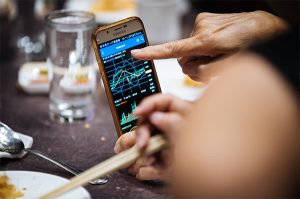Date: July 20, 2020

- The STI lost 34 points or 1.4% at 2,618.48;
- Bad economic news depressed prices, vaccine hopes and firm Wall St provided support;
- Local economy contracted a record 12.6% in 2Q, entered into a technical recession;
- SGX queried Biolidics over disclosure of its A*Star agreement;
- Resorts World retrenched staff;
- Top Glove and other healthcare firms were in play
Vaccine hopes vs weak economic news
The main feature of last week’s trading was that even as the economic news continued to worsen, stocks remained supported. The source of the support was twofold – the extraordinary monetary injections by central banks and hopes that a vaccine for the COVID-19 virus might be found sooner rather than later.
The main inspiration for buying stocks came from Wall Street, where investors appeared ready to brush aside the rising number of US virus infections. On Thursday alone, the country reported a record 77,000 new cases, in what has been a string of daily records. Friday’s number was just over 70,000.
Still, the weak economic outlook took its toll, with the Straits Times Index losing about 34 points or 1.3% over the week at 2,618.48.
Moderna’s announcement brought on the hopes
The US biotech firm Moderna said on Tuesday it would enter the final stage of its human trials for its vaccine on July 27, after promising early results were published in a journal.
The Phase 3 trial will recruit 30,000 participants in the US, with half to receive the vaccine at 100 microgramme dose levels, and the other half will receive a placebo.
It is designed to learn whether the vaccine can prevent infection by the virus, or, if people still get infected, whether it can prevent the infection progressing towards symptoms.
Local economy entered into technical recession in Q2
Singapore’s economy shrank by 12.6 per cent year on year in the second quarter, according to advance estimates from the Ministry of Trade and Industry (MTI) released on Tuesday last week, as circuit breaker measures to stem the coronavirus pandemic took their toll.
The decline in gross domestic product (GDP) was worse than the 10.5 per cent drop economists had anticipated. It was also much worse than in the first quarter when GDP turned negative for the first time in a decade, with the economy contracting by a revised 0.3 per cent.
MTI said the GDP plunge was due to the circuit breaker measures that were implemented from April 7 to June 1 to slow the spread of Covid-19, as well as weak external demand amid a global economic downturn.
On a quarter-on-quarter basis, the economy shrank a record 41.2 per cent in the three months to June – entering a technical recession for the first time since 2009. A technical recession refers to two straight quarters of quarter-on-quarter contraction.
SGX queried Biolidics
The Singapore Exchange (SGX) on Wednesday posed a series of queries to Biolidics about the details of a licence agreement the Catalist-listed firm had inked as well as the timing of its trading halt and announcement.
Biolidics on Tuesday said it had on 9 July entered into a five-year licence agreement with Accelerate Technologies, the commercialisation arm of the Agency for Science, Technology and Research or A*Star, to use agency’s technology for the detection of COVID-19 antibodies.
SGX asked Biolidics to provide reasons for the delay in announcing the agreement and whether the company’s sponsor was aware and was consulted on the disclosure of the deal, and the advice given by the sponsor.
On Friday, the firm replied, saying that the delay was partly because of the long weekend that included Polling Day on 10 July. It also said it anticipates that it would take up to 9 months to incorporate A*Star’s technology into a new test kit.
Biolidics emphasized “there is no certainty that the company will be able to, among others, successfully develop the serology tests which incorporate the technology’’.
Sembcorp Marine reported first half loss of S$192m
Sembcorp Marine last week announced a net loss of S$192m for the six months ended 30 June and warned of more losses to come in the months ahead. Since April, all of its Singapore yards were forced to stop work because of the virus pandemic, which resulted in significant project delays. Revenue in the first half was S$906m, down 41% from the same period last year.
Resorts World retrenched staff
On Wednesday, Resorts World said it is now retrenching staff but did not disclose how many would be affected. Analysts said based on trends in the gaming industry, the layoffs could affect 10-15% of the casino operator’s 9,400 employees. According to other news reports, sister company Genting Malaysia Resorts has already slashed its own headcount by 15% or about 3,000 employees.
Top Glove was among top healthcare plays
On Wed 15 Jul, US Customs and Border Protection (CBP) issued a detention order on the gloves produced by two of Top Glove’s subsidiaries, possibly over forced labour concerns. The company said it is reaching out to the CBP through its US office to try and resolve the issue.
Maybank Kim Eng said on Friday that about 12.5% of Top Glove’s sales volume could be temporarily affected by US detention order. “We advocate investors to BUY on weakness for: (i) The issue could be resolved in 2-4 weeks as Top Glove settles the retrospective recruitment fees; (ii) In the event that the issue is long-drawn, Top Glove may re-route the detained shipments to other markets’’.
On Thursday when the announcement was known here, Top Glove’s shares plunged S$0.81 or 11% to S$6.49. They rebounded on Friday to close at S$7.52.





